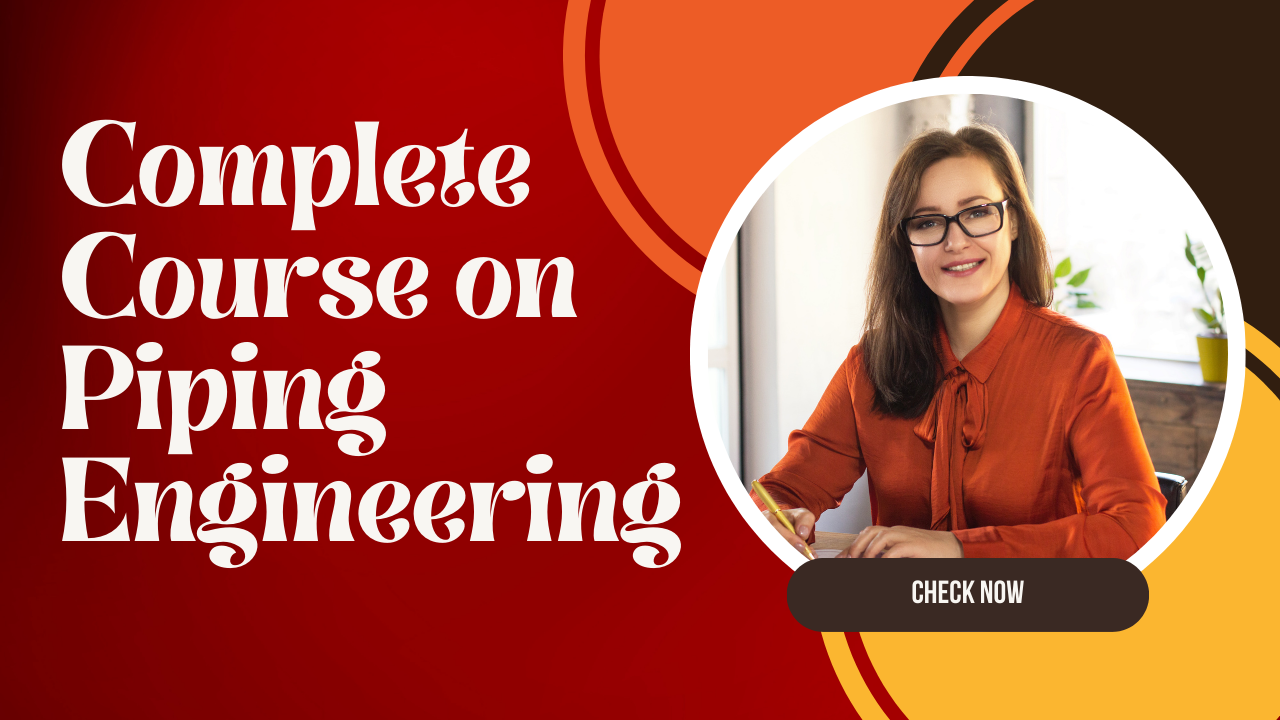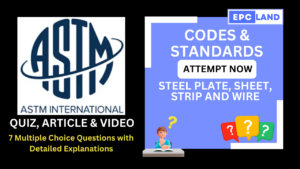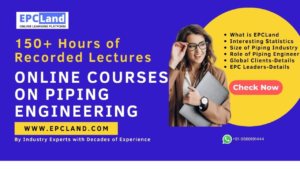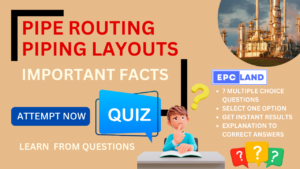Introduction
Piping Engineering is a critical discipline in various industries, particularly in the oil and gas sector. It involves the design, analysis, and construction of complex piping systems that transport fluids and gases safely and efficiently. In this comprehensive course on Piping Engineering, we cover four essential sections that provide a deep dive into this field, equipping you with the knowledge and skills needed to excel in this demanding profession.
Table of Contents
Don’t miss the Complete Course on Piping Engineering: Check Now
By EPCLand.com
Reaping the Benefits of This Course
In this final section, we highlight the numerous advantages you’ll gain by enrolling in our comprehensive Piping Engineering course. We’ve meticulously designed this course to provide you with a rewarding and enriching learning experience.
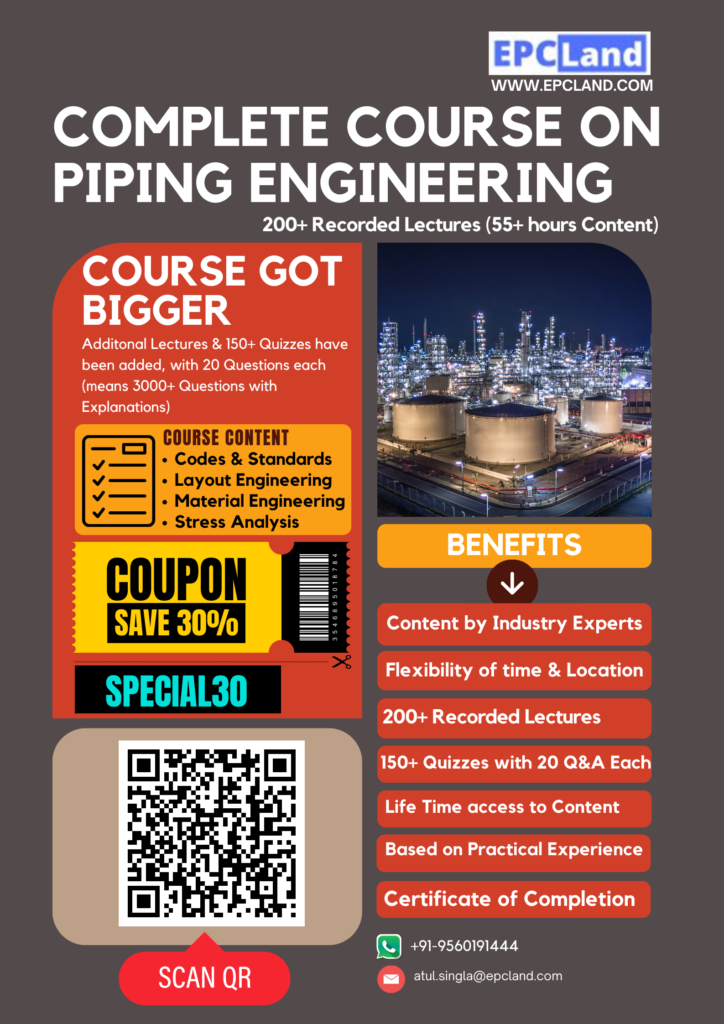
Content by Industry Experts
Our course content is crafted and delivered by seasoned industry experts with extensive knowledge and practical experience in the field of Piping Engineering. You can trust that the information you receive is not only accurate but also deeply insightful, offering you valuable insights that only experts can provide.
Flexibility of Time & Location
We understand the demands of a busy life, and that’s why our course offers the flexibility to learn at your own pace and from any location. Whether you’re a full-time professional, a student, or someone with a busy schedule, you can access our course materials whenever and wherever it’s convenient for you.
200+ Recorded Lectures
To ensure a comprehensive learning experience, we provide over 200 recorded lectures covering a wide range of topics in Piping Engineering. These lectures are structured to deliver in-depth knowledge while accommodating your schedule.
150+ Quizzes with 20 Q&A Each
Our collection of 150+ quizzes, each with 20 thought-provoking questions and answers, serves as a valuable tool for self-assessment and knowledge reinforcement. These quizzes allow you to test your understanding of course material and track your progress.
Lifetime Access to Content
When you enroll in our course, you gain lifetime access to all course materials. This means you can revisit the lectures, quizzes, and resources whenever you need to refresh your knowledge or explore advanced topics. We’re committed to being a long-term resource for your professional development.
Based on Practical Experience
Our course is rooted in practical experience, ensuring that you gain knowledge and skills that are immediately applicable in real-world scenarios. We prioritize real-world examples and case studies to enhance your understanding of the subject matter.
Certificate of Completion
Upon successfully completing the course, you’ll receive a Certificate of Completion, which can be a valuable addition to your professional portfolio. This certificate signifies your dedication to mastering Piping Engineering and your commitment to excellence in the field.
In conclusion, our comprehensive Piping Engineering course offers unparalleled benefits, including access to expertise, flexibility in learning, a wealth of educational resources, and the recognition of your achievements through a certificate. By embarking on this learning journey, you’re positioning yourself for success in the exciting and dynamic world of Piping Engineering.
Don’t miss the Complete Course on Piping Engineering: Check Now
By EPCLand.com
Section 1: Fundamental Concepts in Piping Engineering
Section 1: Fundamental Concepts
- Energy Sector and Oil & Gas Industry
- Crude Oil Processing and Refinery vs. Petro-Chemical
- What is Piping Engineering and Engineering Organization
- Piping Discipline and Various Disciplines & Stakeholders
- How Piping Department Works and Piping Systems for Beginners
- Life Cycle of Oil & Gas Projects
- Components of Piping Engineering
- Piping Deliverables & Non-Deliverables
- Manhour Estimation
1.1 Energy Sector and Oil and Gas Industry
We kick off the course by exploring the dynamic Energy Sector and the multifaceted Oil and Gas Industry. Understanding the context and significance of piping engineering within these domains sets the stage for a comprehensive learning journey.
1.2 Crude Oil Processing and Refinery vs. Petro-Chemical
The first section dives into the heart of the oil and gas industry, examining the intricate process of Crude Oil Processing. Additionally, we clarify the distinctions between Refineries and Petro-Chemical plants, essential for comprehending their roles and functions in this sector.
1.3 What is Piping Engineering and Engineering Organization
Piping Engineering is at the core of this course. We delve into its fundamental principles and explore the organizational structures that underpin successful project execution in the industry.
1.4 Piping Discipline and Various Disciplines & Stakeholders
Understanding the Piping Discipline is crucial. We also identify the diverse stakeholders involved in oil and gas projects, emphasizing the need for effective collaboration.
1.5 How Piping Department Works and Piping Systems for Beginners
This section unravels the inner workings of the Piping Department and provides an introduction to Piping Systems, making it accessible even to beginners.
1.6 Life Cycle of Oil & Gas Projects
To appreciate the full spectrum of oil and gas projects, we explore their life cycle, divided into Initiation, Planning & Execution, and Closing phases.
1.7 Components of Piping Engineering
In this segment, we dive into the core components of Piping Engineering, including Pipes, Valves & Flanges, Strainers & Steam Traps, and the critical role of Codes & Standards.
1.8 Piping Deliverables & Non-Deliverables and Manhour Estimation
We conclude Section 1 by examining the documentation aspect, highlighting the importance of Piping Deliverables & Non-Deliverables, and addressing the critical issue of Manhour Estimation.
Don’t miss the Complete Course on Piping Engineering: Check Now
By EPCLand.com
Section 2: Metallurgy and Material Standards
Section 2: Metallurgy and Material Standards
- Basics of Metallurgy
- Understanding FCC & BCC Structures
- Voids, Slips & Dislocations
- Behavior of Carbon and Various ASTM Standards
- Inspection, Testing & Marking
- Impact Testing
2.1 Basics of Metallurgy
In Section 2, we delve into the fascinating world of metallurgy, introducing the basics of this science, including crystal structures.
2.2 Understanding FCC & BCC Structures, Voids, Slips & Dislocations
We explore the intricacies of FCC and BCC structures, as well as delve into the microscopic world of Voids, Slips, and Dislocations that impact material behavior.
2.3 Behavior of Carbon and Various ASTM Standards
Carbon’s behavior is a critical aspect of metallurgy, and we investigate its influence. Furthermore, we delve into ASTM Standards for different materials.
2.4 Inspection, Testing & Marking
Quality control is pivotal, and we examine Metallurgical Test Index, Destructive Tests, Non-Destructive Testing, Pipe Inspection, and Marking.
2.5 Impact Testing
We wrap up this section by discussing the significance of Impact Testing in assessing material strength and resilience.
Don’t miss the Complete Course on Piping Engineering: Check Now
By EPCLand.com
Section 3: Piping Design and Layout
Section 3: Piping Design and Layout
- Interaction with Process Department and Design Basis
- 3D Model and Layout Development
- Various Piping Applications (e.g., Pump Piping, Exchanger Piping)
- Underground Piping and Model Reviews
- Material Take-off and Piping General Arrangement Drawings
- Nozzle Orientations and Isometrics
3.1 Interaction with Process Department and Design Basis
Effective collaboration with the Process Department is explored, with a focus on establishing a solid Design Basis.
3.2 3D Model and Layout Development
We delve into the power of 3D modeling and its role in Layout Development, including the creation of Plot Plans.
3.3 Various Piping Applications
Specific piping applications are covered in detail, including Pump Piping, Piperack Piping, Exchanger Piping, Compressor Piping, Column Piping, and Tank Farm Layout.
3.4 Underground Piping and Model Reviews
Underground Piping presents unique challenges, and we explore how to address them. Model reviews are discussed as essential for project integrity.
3.5 Material Take-off and Piping General Arrangement Drawings
The importance of Material Take-off and Piping General Arrangement Drawings in project management is highlighted.
3.6 Nozzle Orientations and Isometrics
The orientation of nozzles and the creation of detailed Isometrics are critical considerations in the design phase.
Don’t miss the Complete Course on Piping Engineering: Check Now
By EPCLand.com
Section 4: Stress Analysis and Optimization
Section 4: Stress Analysis and Optimization
- Basics of Stress Analysis and Inputs Required
- Stress Critical Line List and WRC Standards
- Thickness Calculation and Flange Leakage Checking
- Expansion Loop Calculation and Learning Caesar II
- Creating Load Cases and Wind & Seismic Analysis
- Slug & Surge Analysis, Modal Analysis, and Stress Analysis Applications
- Pipe Supports and Optimization Rules
4.1 Basics of Stress Analysis and Inputs Required
Stress Analysis is a core component of Piping Engineering. We start by understanding its basics and the essential inputs needed.
4.2 Stress Critical Line List and WRC Standards
Identifying critical points and adhering to industry standards, such as WRC 537 and WRC 297, are essential for sound stress analysis.
4.3 Thickness Calculation and Flange Leakage Checking
Determining the right thickness for pipes and conducting Flange Leakage Checks are vital for structural integrity.
4.4 Expansion Loop Calculation and Learning Caesar II
We explore the complexities of Expansion Loop calculation and introduce Caesar II, a powerful software tool for stress analysis.
4.5 Creating Load Cases and Wind & Seismic Analysis
Creating Load Cases is crucial for simulating real-world scenarios. We delve into the application of Wind & Seismic Analysis in stress assessment.
4.6 Slug & Surge Analysis, Modal Analysis, and Stress Analysis Applications
We tackle dynamic forces with Slug & Surge Analysis and explore Modal Analysis. Stress analysis applications are discussed for various scenarios, including Pump Piping, Horizontal Vessels, Buried Pipe, Storage Tanks, GRE Piping, FRP Piping, and PSV Piping.
4.7 Pipe Supports and Optimization Rules
The critical role of Pipe Supports is detailed, along with the List & Role of Supports, Supporting Span, and considerations for Standard and Special Supports. Optimization Rules are discussed for efficient design.
Section 5: Assessing Your Knowledge Through 160+ Topic-wise Quizzes
In this final section of our comprehensive course on Piping Engineering, we provide you with a valuable opportunity to assess your knowledge and reinforce your understanding. We’ve meticulously curated a collection of over 160 topic-wise quizzes, each consisting of 20 thought-provoking questions. These quizzes are designed to cover all the key areas and topics explored throughout the course, allowing you to gauge your grasp of the material.
Whether you’re looking to test your newfound knowledge after each section or prefer a comprehensive review at the end of the course, these quizzes are an invaluable resource. They serve as checkpoints, helping you identify areas where you excel and pinpointing topics that may require further study.
By actively engaging with these quizzes, you not only solidify your understanding of Piping Engineering concepts but also gain the confidence to apply your knowledge in real-world scenarios. Successful completion of these quizzes demonstrates your readiness to tackle the challenges and complexities of the field.
Each quiz is meticulously crafted to challenge your comprehension, critical thinking, and problem-solving skills, ensuring that you’re well-prepared for the demands of the Piping Engineering profession. Whether you’re a novice embarking on a new career or a seasoned professional seeking to enhance your expertise, these quizzes offer an effective and engaging way to reinforce your learning journey.
Don’t miss the Complete Course on Piping Engineering: Check Now
By EPCLand.com
Conclusion
In this comprehensive course on Piping Engineering, we’ve covered a wide range of topics, from fundamental concepts to advanced stress analysis techniques. Whether you’re new to the field or looking to expand your knowledge, this course equips you with the skills and insights needed to excel in the world of Piping Engineering. From understanding the energy sector to mastering stress analysis, you’re now prepared to tackle the complex challenges of this dynamic field.
Recommended courses (Published on EPCLand)
- Basics of Piping Engineering
- Piping Layout Engineering
- Piping Material Engineering
- Piping Stress Analysis
- Complete Course on Piping Engineering
- Material Requisitions
- Piping Material Specifications
- Valve Material Specifications
Don’t miss the published articles on following:
